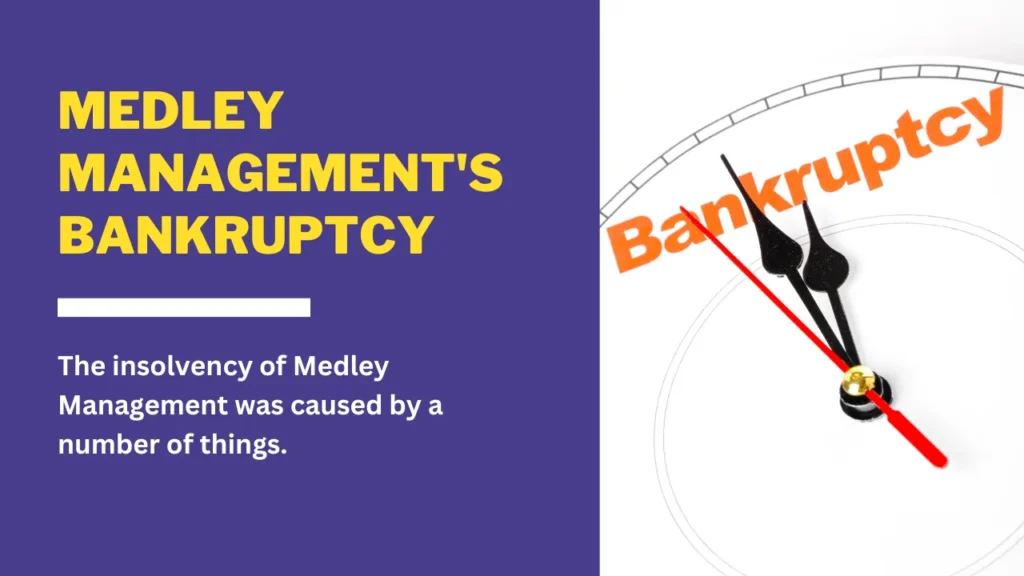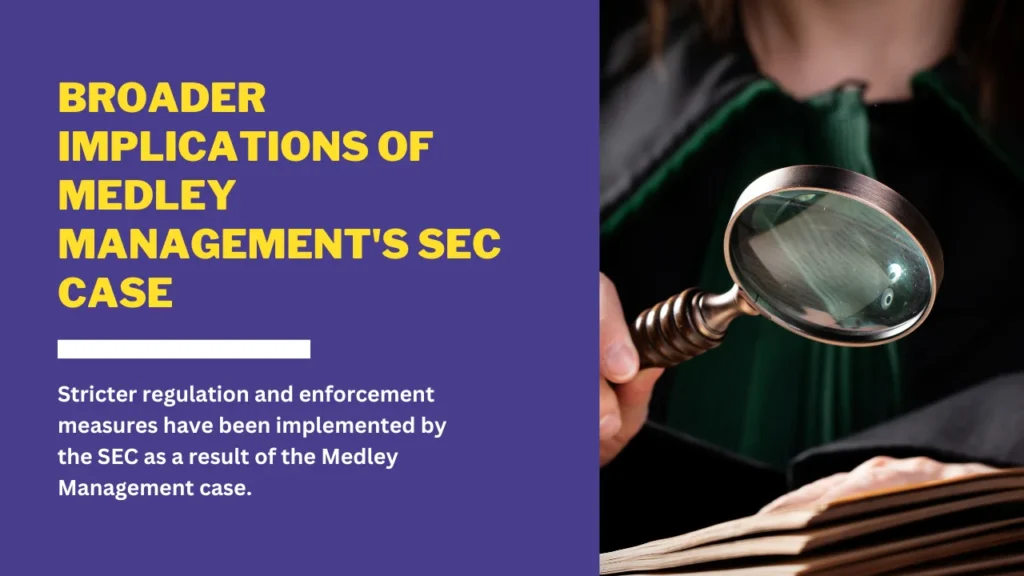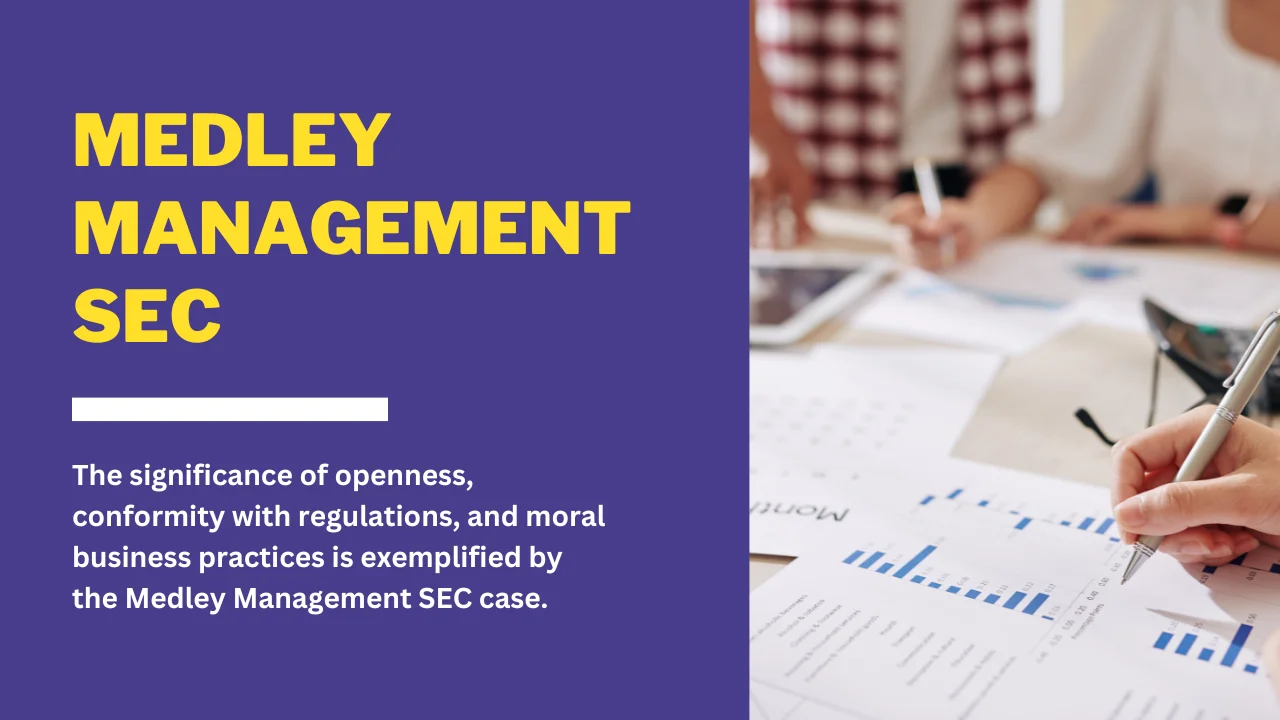Introduction
The significance of openness, conformity with regulations, and moral business practices is exemplified by the Medley Management SEC case. As a result of multiple infractions that resulted in heavy fines and operational difficulties, the alternative asset management business Medley Management Inc. and its co-CEOs, Seth and Brook B. Taube, were subject to intense regulatory scrutiny. Examining the infractions, repercussions, and wider ramifications for the financial sector, this article dives into the specifics of the SEC proceedings involving Medley Management.
Overview of Medley Management Inc.

The credit-related investment strategies industry was Medley Management Inc.’s main focus. Direct lending to middle-market companies was the firm’s primary focus when it was founded by the Taube brothers. Medley’s varied portfolio of business development companies (BDCs), private funds, and separately managed accounts (SMAs) is the product of their business model, which encompasses sourcing transactions, performing due diligence, negotiating terms, and closing deals.
Key Violations and SEC Proceedings
Providing False Information Regarding AUM
There has been evidence that Medley Management Inc. and its affiliates have been negligently inflating their AUM since at least August 2016. A portion of the “commitment” funds from non-discretionary SMAs were included in this deception; these funds were not obligated by law to be invested. The overstated AUM numbers caused investors to be misled regarding Medley’s financial well-being and future growth opportunities. These numbers were critical because they affected how investors saw Medley and were associated with the management fees that the company received, which made up a large portion of its income.
Deceptive Projections and Bond Offerings
Medley solicited around $122 million from individual investors between August 2016 and February 2017 via bond sales that featured the exaggerated AUM numbers. When it came to the investment of capital by non-discretionary SMAs, Medley LLC also made unrealistic predictions about future performance. A layer of deceit was added to Medley’s proposals and investor communications by using these misleading projections.
Inadequate Disclosure Controls
According to the SEC’s findings, Medley Management Inc. violated the rules of the Exchange Act by failing to maintain sufficient disclosure controls and procedures. Because of this oversight, important information was communicated to investors at an inappropriate time and with incorrect accuracy. To make matters worse, the Taube brothers falsely certified that these controls were effective, which only made the violations worse.
Impact and Consequences
Medley Management Inc. and the Taube brothers were hit hard by the SEC’s findings and penalties. Brook Taube Medley was censured and fined $4 million for continuing to violate the rules. The company was also ordered to stop violating the rules altogether. A $4 million fine was levied against Brook, while a $2 million fine was levied against Seth Taube. The seriousness of their wrongdoing and the hope that it would discourage similar actions prompted these sanctions.
Structural and Operational Background
A substantial number of units in Medley LLC were owned by Medley Management Inc., which was organized as a holding company. Although MDLY was a publicly traded company, the Taube family held substantial voting power through their separate entity, Medley Group LLC. As a result of this arrangement, the Taubes were able to influence the disclosure practices and financial reporting of Medley and have a significant impact on the company’s operations and strategic decisions.
Decline and Bankruptcy
Over time, Medley’s financial performance declined, even though there were attempts to forecast growth and stability. As a result of internal operational issues and larger difficulties in the direct lending market, the company’s Fee-Earning Assets Under Management (FEAUM) kept going down. Medley LLC’s business trajectory took a sharp turn for the worse when the company filed for Chapter 11 bankruptcy protection in March 2021.
Implications for the Financial Industry
A lot of people in the banking and finance industries will be affected by the Medley Management SEC case. Maintaining investor trust and regulatory compliance is greatly aided by accurate financial reporting and robust disclosure controls. The case highlights the importance of ethical corporate governance and the possible repercussions of financial misrepresentation.
Role of the Taube Brothers
Leadership and Decision-Making
Medley Management’s operations and strategic decisions were heavily influenced by co-CEOs Brook and Seth Taube. The trajectory of the firm, including its compliance with regulatory requirements and ethical standards, was greatly affected by their leadership style and decision-making processes.
Control Over Medley LLC
The Taube brothers had a lot of say in how Medley LLC ran and reported its finances because they controlled the company through Medley Group LLC. The Taubes were able to put short-term profits ahead of long-term compliance and openness thanks to this control structure, which is why the SEC found violations.
Impact on Investor Trust
A lot of people lost faith in the company because of what the Taube brothers did. Significant financial and reputational harm was inflicted upon the company as a result of investor confidence being eroded due to the misrepresentations and inadequate disclosure controls. The penalties imposed by the Brook Taube SEC were an attempt to discourage future wrongdoing and bring about a degree of accountability.
Lessons Learned from the Medley Management Case
The Importance of Transparency
Transparency in financial reporting is a crucial lesson that can be learned from the Medley Management case. In order to keep investors’ trust and stay in compliance with regulations, it is critical to disclose material information accurately and promptly. Avoiding the traps of misrepresentation and the heavy fines that can follow requires companies to prioritize transparency.
The Role of Corporate Governance
If we want businesses to follow the rules and be ethical, we need good corporate governance. It is clear from the Medley Management case that robust governance mechanisms are necessary to forestall the sort of wrongdoing that prompted the SEC to take action. Firms need to set up strong governance structures to monitor their activities and make sure they follow all financial rules.
Maintaining Adequate Disclosure Controls
Proper disclosure controls must be in place, as the Medley Management case shows. In order to keep investors informed of all relevant information in a timely manner, companies should set up and maintain internal controls. To that end, it is necessary to establish rigorous auditing procedures and verify the authenticity of all control effectiveness certifications.
The Consequences of Misrepresentation
The severe penalties imposed on the Taube brothers and Medley Management show how serious the consequences of financial misrepresentation can be. Even inadvertently misrepresenting investors can have serious financial and legal consequences, and companies need to be aware of this. Businesses must take the initiative to be transparent and compliant in order to prevent these kinds of consequences.
Investor Protection and Regulatory Oversight
The case against Medley Management by the SEC emphasizes the need for regulatory supervision and safeguards for investors. When it comes to protecting investors’ interests and making sure businesses follow financial reporting standards, regulatory agencies are indispensable. The case highlights the importance of regulatory authorities being vigilant in order to detect and resolve violations.
Medley Management’s Bankruptcy

Factors Leading to Bankruptcy
The insolvency of Medley Management was caused by a number of things. Among these were the financial burden caused by SEC penalties, wider market difficulties in the direct lending sector, and the declining performance of its Fee-Earning Assets Under Management (FEAUM). The company’s financial woes were made worse by its repeated failure to win back the confidence of its investors.
Bankruptcy Proceedings
A petition for Chapter 11 bankruptcy was lodged by Medley LLC in March 2021. Operating difficulties, regulatory scrutiny, and financial mismanagement all contributed to the precipitous decline in the company’s fortunes that was detailed in this filing. A reorganization of Medley’s debts and a possible road to recovery or orderly dissolution were the goals of the bankruptcy proceedings.
Impact on Stakeholders
Investors, workers, and creditors were all profoundly affected by Medley’s bankruptcy. The insolvency of Medley and the subsequent fall in the value of its assets caused investors to suffer heavy losses. Creditors had to figure out how to get their money back through the complicated bankruptcy procedures, while employees worried about losing their jobs.
Future Actions for Companies
Enhancing Disclosure Practices
By improving their disclosure practices, companies can gain valuable lessons from Medley Management’s mistakes. Accurate reporting of all financial data, regular audits, and strong internal controls are all part of this process. Keeping the faith of investors and avoiding fines from regulators requires open and honest communication.
Strengthening Corporate Governance
To avoid future instances of misconduct like the one at Medley Management, it is crucial to strengthen corporate governance. Independent boards of directors, stringent ethical standards, and executive accountability should all be part of every company’s governance structure. The best way to prevent infractions from getting worse is to have a system in place that can identify them early on.
Adopting a Proactive Compliance Approach
Implementing thorough compliance programs, keeping up with regulatory changes, and performing risk assessments on a regular basis constitute a proactive approach to compliance. Businesses should encourage a culture of compliance in which following rules is highly valued and any violations are handled quickly.
Lessons from the SEC’s Enforcement Actions
Companies can learn a lot from the SEC’s enforcement actions that were taken against Medley Management. The case shows how crucial it is to follow regulations, have good disclosure controls in place, and keep financial reports accurate. Businesses need to be aware of the possible repercussions of noncompliance and do what they can to prevent them. For instance, looking into the practices at Brook Taube Medley Capital could provide valuable insights into effective compliance strategies.
Broader Implications of Medley Management’s SEC Case

Impact on the Financial Industry
Many people in the financial sector, especially those working for alternative asset management companies, are watching the SEC’s actions against Medley Management very closely. This case should serve as a warning to other companies about the importance of accurate and transparent financial reporting.
Influence on Regulatory Policies
Stricter regulation and enforcement measures have been implemented by the SEC as a result of the Medley Management case. In an effort to forestall such infractions, regulatory agencies are increasingly checking financial disclosures and corporate governance procedures.
Investor Confidence
Market confidence has been impacted by the case as well. Stricter due diligence procedures are being adopted by asset management firms in response to investors’ growing demands for greater openness and responsibility on the part of these companies.
Corporate Governance Reforms
Numerous businesses have revised their approaches to corporate governance in the wake of the Medley Management controversy. More and more, businesses are putting measures in place to prevent wrongdoing and guarantee compliance through strong governance structures, such as independent boards of directors and improved oversight mechanisms.
Lessons for Corporate Executives
Ethical Leadership
Ethical leadership is crucial in corporate governance, as demonstrated by the actions of Brook and Seth Taube. For the sake of building trust and avoiding regulatory scrutiny, corporate executives should make ethical decision-making and transparency their top priorities.
Responsibility and Accountability
Executives must own up to their mistakes and make sure their companies follow the rules, as this case shows. It is the responsibility of executives to ensure that disclosure controls are effective and that accurate financial records are maintained, as emphasized in the Brook Taube Wells Notice.
Risk Management
Preventing violations like the ones that occurred in the Medley Management case requires effective risk management. To make sure they are in compliance with regulations, businesses need to assess risks, put plans in place to lessen them, and check in on their compliance programs often.
Improving Financial Reporting Practices
Accuracy and Transparency
Financial reporting must be accurate and transparent, as shown in the Medley Management case. All financial information must be reported accurately and any discrepancies must be addressed promptly by the company.
Implementing Robust Controls
For financial disclosures to be accurate and in line with regulatory requirements, firms should establish strong internal controls. As part of this process, we conduct comprehensive reviews, conduct audits on a regular basis, and check the authenticity of all control effectiveness certifications.
Training and Education
In order to keep up with the ever-changing financial reporting standards, it is crucial that executives and employees receive ongoing education and training. It is the responsibility of businesses to provide their employees with enough training so that they can comply with financial reporting regulations and industry standards.
The Role of External Auditors
Independent Oversight
In order to ensure that a company’s financial reporting practices are being independently monitored, external auditors are indispensable. Their assistance is crucial in guaranteeing the accuracy and conformity of financial statements with regulatory standards.
Detecting Irregularities
In addition to assisting with the detection of financial reporting irregularities, external auditors can also offer suggestions for enhancing internal controls. Their impartial viewpoint is helpful for spotting problems that the in-house team might miss.
Ensuring Compliance
Companies’ compliance with all applicable regulatory requirements is another important aspect that external auditors assist with. Their supplementary examination can aid in avoiding infractions like the one at Medley Management.
FAQs
What was the main violation in the Medley Management SEC case?
The main violation was the misrepresentation of Assets Under Management (AUM).
Who were the key executives involved in the Medley Management case?
The key executives were Brook Taube and Seth Taube, co-CEOs of Medley Management.
What were the consequences of the SEC actions against Medley Management?
Medley Management faced significant penalties, including a civil penalty of $4 million and cease-and-desist orders.
How did the SEC’s findings impact Medley Management’s financial health?
The SEC’s findings led to a decline in investor confidence and financial performance, ultimately contributing to Medley’s bankruptcy.
What lessons can other companies learn from the Medley Management case?
Other companies can learn the importance of transparency, ethical leadership, and robust compliance programs to avoid similar violations.
Conclusion
Transparency, compliance with regulations, and ethical corporate governance are emphasized once again in the Medley Management SEC case. Regulatory fines and operational decline were the results of Brook and Seth Taube’s actions as well as structural and operational issues that Medley Management encountered. In order to keep investors’ faith and stay in compliance with regulations, the case highlights the need of accurate financial reporting, strong disclosure controls, and good corporate governance. Companies can adopt best practices to improve transparency, governance, and compliance risk management by learning from Medley Management’s failures.

David Weber is an experienced writer specializing in business and related fields, delivering insightful and informative content for diverse audiences.





